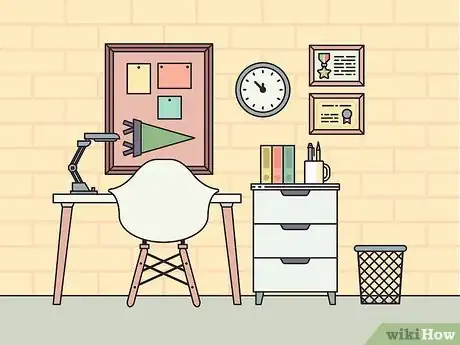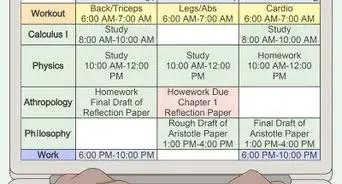This article was co-authored by Nathan Fox, JD. Nathan Fox is an LSAT teacher, the co-host of the Thinking LSAT Podcast, and the co-founder of LSATdemon. Nathan is the author of six LSAT books including The Fox LSAT Logical Reasoning Encyclopedia. He scored a 179 on the February 2007 LSAT and holds a JD from the University of California, Hastings College of the Law.
There are 15 references cited in this article, which can be found at the bottom of the page.
wikiHow marks an article as reader-approved once it receives enough positive feedback. This article received 69 testimonials and 91% of readers who voted found it helpful, earning it our reader-approved status.
This article has been viewed 1,027,032 times.
Studying is such an important part of school, yet it’s often one of the things students struggle with the most. If you have a hard time studying seriously, you’re not alone! Get into a habit of studying at the same time every day, break down your work into small tasks, and pick something to reward yourself with when you’re done. With time, you can make studying a fruitful part of your day and break the procrastination and guilt cycle.
Steps
Motivating Yourself
-
1Keep a list of the reasons why you need or want to study. Whatever your reasons are, write them down on a piece of paper and keep them somewhere you can see them often. When you feel like skipping out on studying, read them over to remind yourself of why you need to work hard.[1]
- Reasons to study can range from wanting to get good grades so you can get into a good college to keeping a scholarship to simply not getting in trouble for getting bad grades. No reason is too big or too small to add to your list![2]
Tip: Keep in mind that you may not feel motivated all the time, and that is okay! What’s important is that you can use self-discipline to keep yourself on track even in those times you aren’t feeling the motivation.
-
2Make boring information more interesting so it’s easier to study. Ask yourself, “How does this material relate to my life?” or “How can I use this in my life?” For example, if you’re bored by the book you have to read for English class, ask yourself how you can relate to the characters in the book to keep yourself engaged. Or, if you’re struggling with studying for biology, get interested in how much you can learn about your yourself and all the living things around you.[3]
- It can be difficult to be interested in everything, and some subjects just won’t captivate you. But, try your best to figure out how everything you’re learning can apply to your own life. That personal connection could spark enough interest to keep you going!
Advertisement -
3Set a timer so that you know there is an end in sight. Nobody wants to study for hours on end without a stopping point. Give yourself frequent, regular breaks during your study time. You could set an end time for the day, too, so that you know at the latest how long you’ll be studying.[4]
- For your actual study blocks, set a timer for 30-50 minutes and then take a timed break before getting back to work. You’ll study more efficiently if you know a timer will be going off soon.
- If you study right after school, you could commit to working until dinner time but then give yourself the rest of the evening off. Or, if you study at night, set a timer for 30 minutes before your bedtime so you can wind down.
Try the Pomodoro Technique: Set a timer for 25 minutes; once the timer goes off, take a 5-minute break. Study for another 25 minutes, and then take another 5-minute break. Every four 25-minute blocks, let yourself take a 15-20 minute break.
-
4Reward yourself at the end of each study block to keep yourself going. This can be something really small, like getting to enjoy a piece of your favorite candy at the end of each block of time, getting to check Twitter or Instagram for 5 minutes, or taking a break to cuddle your pet.[5]
- You could also plan a fun reward for the end of each exam to celebrate all your hard work! Getting coffee with friends, taking a long bath, buying something you’ve had your eye on—make it something that you love to do so it feels more meaningful once you’ve taken a test.
-
5Enlist the help of a study-buddy. This doesn’t have to mean you actually sit down and study together. Rather, this is a person you can check in with every day to help keep you on track. If you know you have to text someone at the end of the day to tell them if you hit your goals, it could help you stay motivated to study when you don’t feel like it.[6]
- You could ask your study buddy to check in with you if they haven’t heard from you in a few days. This could get you back on track with your plans before too much time passes.
Making a Schedule
-
1Study at the same time every day so it becomes a habit. If you’re a morning person, consider waking up before school to get in some study time. If you’re a night owl, committing a few hours every evening might work best. Or, if you like to get things done so you can move on to more enjoyable tasks, you may want to commit to studying as soon as you get home from school every day.[7]
- If you don’t already, try using a|daily planner. You can use the calendar app on your phone or get a physical planner to write in. Schedule in your study time each day so that you remember to not book anything else for that time.
Keep in Mind: Your weekends might look a little different because you’ll have a different schedule. You may need to schedule bigger blocks of time to study and work on projects over the weekend.
-
2Make a schedule for exams so you can start studying ahead of time. As soon as you learn about a test, write it down in your calendar.[8] If your teacher gave you a schedule at the beginning of the semester, take some time to input all the important due dates and exam dates into your planner.[9]
- For example, if you know you have a Spanish test next Friday and an Algebra test the following Wednesday, you’ll know that you need to study for Spanish first.
- It can even be helpful to write in reminders for the weeks before a test to start studying! For example, if you have a big English test coming up in 3 weeks and you want 2 weeks to study the material, put in a reminder to start studying ahead of time.
-
3Break down the material you need to learn into small sections. To avoid getting overwhelmed by the sheer quantity of what you need to do, break down the information into small, bite-sized pieces. Write down what each piece consists of so you know what you need to tackle when you sit down to study.[10]
- For example, if your Chemistry test is going to cover 5 chapters and vocabulary words, your smaller sections could be made up of reading a chapter at a time and making vocab cards.
- Concentrate on getting 1 step done during each study block. When you’re done, put a checkmark next to it so you can track your progress. This will help you feel more motivated and in control of your study sessions.
-
4Schedule time to rest and relax. It isn’t realistic to expect yourself to be able to study for 5 hours straight—your brain will need a break! You may need to take a short 5-10 minute break every 30 minutes. If you can go a little longer, try studying for 50 minutes before taking a 10-minute break. When you do take a break, stand up, walk around, get some fresh air, get a snack, or simply rest your eyes for a few minutes.[11]
- On a bigger scale, you may need to schedule a few “rest days” for yourself during exam season. If you know you’ll be studying hard for a few weeks, set aside a day where you will free yourself from all studying obligations completely. This will be something to look forward to!
Removing Distractions
-
1Have a healthy snack and drink some water before studying so you can focus. Hunger and thirst can be huge distractions when you sit down to study. Avoid eating sugary foods so that you don’t crash later on. If you’re going to drink caffeine, try to limit yourself to 1-2 cups of coffee or a single soda so that you don’t get jittery.[12]
- Vegetables, fruits, nuts, cheese, popcorn, yogurt, and hummus are great snacks to choose from.
-
2Boost your concentration by taking a quick walk before you study. Work out some nervous energy and boost your endorphins with a 10-15 minute exercise session. When you sit down to study afterward, it’ll be easier for you to focus and retain what you’re studying.[13]
Tip: You could even try studying while you’re exercising. Take your notes to the gym and walk on the treadmill while you read them over. Your body and mind will both feel better when you’re done!
-
3Go someplace where you won’t be distracted by your surroundings. If you’ll be tempted to clean your bedroom or if you live in a noisy space, you may need to find a new study location. Similarly, if you want to study with your friends but find you can’t without getting distracted, you may need to set up some boundaries so that you can concentrate.[14]
- In general, a space that is clear of sights and sounds that will distract you is going to be the best for studying.
Tip: Keep a blank piece of paper next to you. When thoughts pop into your head for things you need to remember or do, just jot them down on the piece of paper.
-
4Turn off all of your electronics that you don’t need for studying. Or, if you need to use your phone for a timer, turn it onto airplane mode so notifications won’t come through. Don’t have the TV on in the background, and put your phone away somewhere you won’t be tempted to look at it, like in a separate room.[15]
- There are also some great apps out there that you can use to help limit how much time you spend on your phone. Some can even block access to specific sites during designated times. Do whatever works best for you, whether that’s getting offline altogether or setting up a few restrictions.
-
5Be selective about whether or not you’ll listen to music while you study. For some people, music is a huge distraction. But for others, some gentle background music can help them concentrate. Try studying with and without background music to see which way works best for you.[16]
- If you’re studying in a public place, playing some light music through your headphones can help you tune out everything else that is going on around you.
- In general, instrumental music is the best for concentration.
-
6Set a timer for 10 minutes and get started! It may seem simple, but just starting is often the biggest hurdle to taking your studying seriously. Set a timer and commit to working on the task at hand. Once the timer goes off, set it for another 15-20 minutes before taking your first break. Once you get started, it’ll be easier to continue.[17]
- Even if you feel behind or like you should have been studying for weeks already, don’t panic. Starting now is better than not starting at all!
Expert Q&A
-
QuestionHow do I study if I have zero motivation?
 Nathan Fox, JDNathan Fox is an LSAT teacher, the co-host of the Thinking LSAT Podcast, and the co-founder of LSATdemon. Nathan is the author of six LSAT books including The Fox LSAT Logical Reasoning Encyclopedia. He scored a 179 on the February 2007 LSAT and holds a JD from the University of California, Hastings College of the Law.
Nathan Fox, JDNathan Fox is an LSAT teacher, the co-host of the Thinking LSAT Podcast, and the co-founder of LSATdemon. Nathan is the author of six LSAT books including The Fox LSAT Logical Reasoning Encyclopedia. He scored a 179 on the February 2007 LSAT and holds a JD from the University of California, Hastings College of the Law.
LSAT Teacher, Founder of LSATdemon Try to study for a little bit every day so you don't have to cram all of the information the night before.
Try to study for a little bit every day so you don't have to cram all of the information the night before. -
QuestionI used to be a very good student but I just dropped drastically. What should I do about it?
 Community AnswerDetermine the source of what is causing you to drop drastically. Has something happened in your life lately to distract you or to reduce your motivation? It is important to tackle that particular issue head on. Also, don't think about your friends having fun and going out -- concentrate on getting the studies done first, then playing hard after as your reward. The article has plenty of helpful ideas.
Community AnswerDetermine the source of what is causing you to drop drastically. Has something happened in your life lately to distract you or to reduce your motivation? It is important to tackle that particular issue head on. Also, don't think about your friends having fun and going out -- concentrate on getting the studies done first, then playing hard after as your reward. The article has plenty of helpful ideas. -
QuestionWhen I take breaks, I never go back to studying. What can I do?
 Community AnswerTake any break stuff (coffee, snacks, magazines, etc.) into the room you've been studying in. At the end of your break, put distractions like phones or magazines somewhere that won't tempt you too much, out of sight. DO NOT WATCH TV ON YOUR BREAK! This will just make you complacent and you won't want to leave. Ideally, have your studying and breaks in a room with a minimal number of electronics.
Community AnswerTake any break stuff (coffee, snacks, magazines, etc.) into the room you've been studying in. At the end of your break, put distractions like phones or magazines somewhere that won't tempt you too much, out of sight. DO NOT WATCH TV ON YOUR BREAK! This will just make you complacent and you won't want to leave. Ideally, have your studying and breaks in a room with a minimal number of electronics.
References
- ↑ https://services.unimelb.edu.au/counsel/resources/study-related-issues/motivation-to-study
- ↑ Nathan Fox, JD. LSAT Teacher, Founder of LSATdemon. Expert Interview. 15 November 2019.
- ↑ https://www.ucl.ac.uk/news/2015/nov/10-ways-motivate-yourself-study
- ↑ https://www.educationcorner.com/study-motivation-tips.html
- ↑ https://www.jmcacademy.edu.au/news-and-events/news/why-it-s-important-to-reward-yourself/
- ↑ https://kidshealth.org/en/teens/motivation.html
- ↑ https://www.educationcorner.com/habits-of-successful-students.html
- ↑ Nathan Fox, JD. LSAT Teacher, Founder of LSATdemon. Expert Interview. 15 November 2019.
- ↑ https://www.apa.org/ed/precollege/psn/2013/09/learning-secrets
- ↑ https://www.oxford-royale.com/articles/tips-studying-motivation.html
- ↑ https://learnmore.uncg.edu/blog/6-strategies-to-stay-motivated-while-learning-online
- ↑ https://hbr.org/2014/10/what-you-eat-affects-your-productivity
- ↑ https://www.oxford-royale.com/articles/tips-studying-motivation.html
- ↑ https://www.educationcorner.com/study-location.html
- ↑ https://youtu.be/AAv0ko2pelE?t=57
- ↑ https://youtu.be/AAv0ko2pelE?t=134
- ↑ https://successatschool.org/advicedetails/442/How-to-Motivate-Yourself-to-Study-as-a-Student
About This Article
To force yourself to seriously study, start by scheduling 1 to 2 hours each day that will only be used for studying. During your study time, work in a quiet, private space without distractions like video games or TV. If you start losing interest, motivate yourself to keep going by listening to rousing music, or doing movements like jumping jacks or shadow boxing. Additionally, plan a reward for yourself after you study, so that you have something to look forward to. For more advice, including how to improve your study habits by eating healthy and exercising, keep reading.














































































